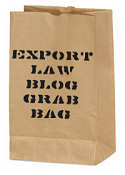 Here are a few recent developments that you may have missed:
Here are a few recent developments that you may have missed:
- Last month we criticized the Department of Justice for conspiring with foreign luxury car makers to jail U.S. citizens who exported luxury cars to China to arbitrage the difference between U.S. and Chinese prices for these vehicles. Apparently, the DoJ now is having second thoughts about wasting taxpayer money and its resources on this nonsense. According to the  New York Times, settlements have recently been reached in nine states where prosecutors have agreed to return seized cars to, and drop charges against, luxury car exporters. Good.
- On Monday we reported that Obama was going to drop Cuba from the list of state sponsors of terrorism, a move we thought was largely symbolic. Yesterday he did just that, and provided the 45-day notice required under the three acts that provide the basis for the list: § 6(j)(4)(A)(i)-(iii) of the Export Administration Act of 1979; § 40(f)(1)(A)(i)-(iii) of the Arms Export Control Act; and § 620A(c)(1)(A)-(C) of the Foreign Assistance Act of 1961. The linked New York Times article wrongly states that Congress can block this action with a joint resolution. Only the Arms Export Control Act provides for this blocking mechanism, and, as we noted, there’s no way that the White House will remove Cuba from the current arms embargo. So a joint resolution under the AECA would be, like the removal itself, largely symbolic
- The Office of Foreign Assets Control (“OFAC”) revised its rules on Monday to amend the Syrian Sanctions Regulations to permit certain activities with respect to written publications, including the ability to pay advances and royalties, to substantively edit manuscripts and to create marketing campaigns. These activities have been permitted for Cuba, Sudan and Iran since 2004. Don’t try this yet in Crimea which remains, bizarrely and incomprehensibly, the most heavily sanctioned place on the face of the planet

 Posted by
Posted by  Category:
Category: 

![Robbins & Myers Belgium HQ via Google Maps http://goo.gl/P9oIwo [Fair Use] Robbins & Myers Belgium HQ via Google Maps http://goo.gl/P9oIwo [Fair Use]](https://www.exportlawblog.com/images/randm_belgium.jpg)
![By CFTC via https://www.flickr.com/photos/cftc/4406624868/sizes/z/ [Public Domain] By CFTC via https://www.flickr.com/photos/cftc/4406624868/sizes/z/ [Public Domain]](https://www.exportlawblog.com/images/cftc.jpg) Both the Commodity FuturesÂ
Both the Commodity Futures !['Syria #1 Donkey, Bashar Assad' by Freedom House https://www.flickr.com/photos/syriafreedom/6731491031/ [CC-BY-2.0 https://creativecommons.org/licenses/by/2.0/] 'Syria #1 Donkey, Bashar Assad' by Freedom House https://www.flickr.com/photos/syriafreedom/6731491031/ [CC-BY-2.0 https://creativecommons.org/licenses/by/2.0/]](https://www.exportlawblog.com/images/bashar_assad.jpg)
![Aramex Employee via http://www.aramex.com/content/uploads/109/243/46240/MainBanner_EXP.jpg [Fair Use] Aramex Employee via http://www.aramex.com/content/uploads/109/243/46240/MainBanner_EXP.jpg [Fair Use]](https://www.exportlawblog.com/images/aramex.jpg) BIS recently announced a
BIS recently announced a 

